At Privin, we understand that hiring a private investigator is a significant decision, often accompanied by questions about the costs involved.
Whether you’re an individual seeking answers to personal matters or a business requiring specialized investigative services, knowing how much it costs to hire a private investigator is crucial. Unlike the glamorous portrayals in movies and television shows, real-world private investigations involve various factors that influence pricing.
In this comprehensive guide we are discussing the costs associated with hiring a private investigator, providing you with in-depth information to make an informed decision tailored to your needs.
Table of Contents
- Key Factors Influencing Cost
- Questions to Consider Before Hiring
- Billing Models
- Special Cases
- How to Save Money
- Comparing Private Investigators
- Legal Considerations
- Final Thoughts
How Much is a Private Investigator?
The cost of hiring a private investigator can vary widely based on several factors, including the billing model they use.
Here’s what you need to know about the two primary pricing structures:
Hourly Rates
Most private investigators prefer to charge an hourly rate due to the unpredictable nature of investigative work. The time required can vary greatly depending on the specifics of your case.
- Range of Rates: Hourly rates typically range from $50 to $500+, influenced by the investigator’s experience, the complexity of the case, and geographic location.
- Average Cost: The national average is around $105 per hour. Less experienced investigators might charge closer to $65 per hour, while specialists with extensive expertise could charge more.
- Example Scenario: Surveillance operations may require long hours with no guarantee of immediate results, justifying the hourly billing approach.
Flat Fees
Flat fees are offered for services that have a well-defined scope and predictable time requirements.
- Suitable Cases: These include background checks, document retrieval, bug sweeps, and missing person searches.
- Cost Expectation: Flat fees can range from a few hundred to several thousand dollars, depending on the service complexity and any additional expenses.
- Advantages: Flat fees provide cost certainty, making it easier to budget for the investigation.
It is crucial to note that only simple cases apply to getting a flat fee charge. Cases such as missing persons, document retrieval, background checks and bug sweeps are less complex, and PIs usually charge a flat fee, including tax and extra costs.
Additionally, some private investigators require a retainer fee before commencing work. This upfront payment covers initial expenses and secures their services. Retainers can range from $1,000 for simpler cases to $5,000 or more for complex investigations. It’s essential to discuss retainer requirements upfront to understand how they affect the overall cost.
Key Factors Influencing Cost
Type of Investigation
The first significant variable that impacts the cost is the nature of the investigation itself. Different types of investigative work require various skill sets, levels of expertise, and time commitment. The list below details the commonly sought-after types of investigation and their general cost range.

- Surveillance is one of the most common case types, and can have a professional cost range of $90 to $200 per hour. The costs not only account for the time spent but also the complexity of the surveillance, including the number of locations and whether additional investigators are needed.
- Background checks and/or background check services can cost anywhere from $50 to $200. Background checks can range from a simple verification of an individual’s education and employment history to comprehensive screenings that include criminal history, social connections, and even personal habits.
- A person locate or locating a missing person can cost $200 to $1000+. Finding a missing person can be a labor-intensive process that involves deep background research, public record searches, and field investigation. Costs can escalate if the search spans multiple jurisdictions or countries.
- Specialized fraud investigations are typically billed at $100 to $300 per hour.
Expertise and Experience
The skill level of the investigator is another critical component in determining the price you can expect to pay. Investigators with a wealth of experience, or specialized knowledge in areas like forensics or cybercrime, often command higher fees.
Experience level plays a part in the cost of a private investigator. Beginner or novice level investigators may take a case on at a lower rate due to their work load or inexperience. In contrast, an investigator with a specialized skill set may be more expensive.
- Beginner level investigators can cost anywhere from $40 to $100 per hour.
- Experienced investigators typically stay with the industry standard rate of $150 to $300 per hour.
A specialized skill set, such as an arson investigator, may charge $350+ per hour.
Investigators early in their career may charge lower fees but also may take longer to achieve the desired results. On the other hand, experienced investigators, while more expensive, often bring the benefit of greater efficiency and a broader network of resources.
Specialized investigators offer niche services, such as forensic accounting, digital forensics, or even maritime investigations. Given the unique skill set, such investigators usually have higher fees.
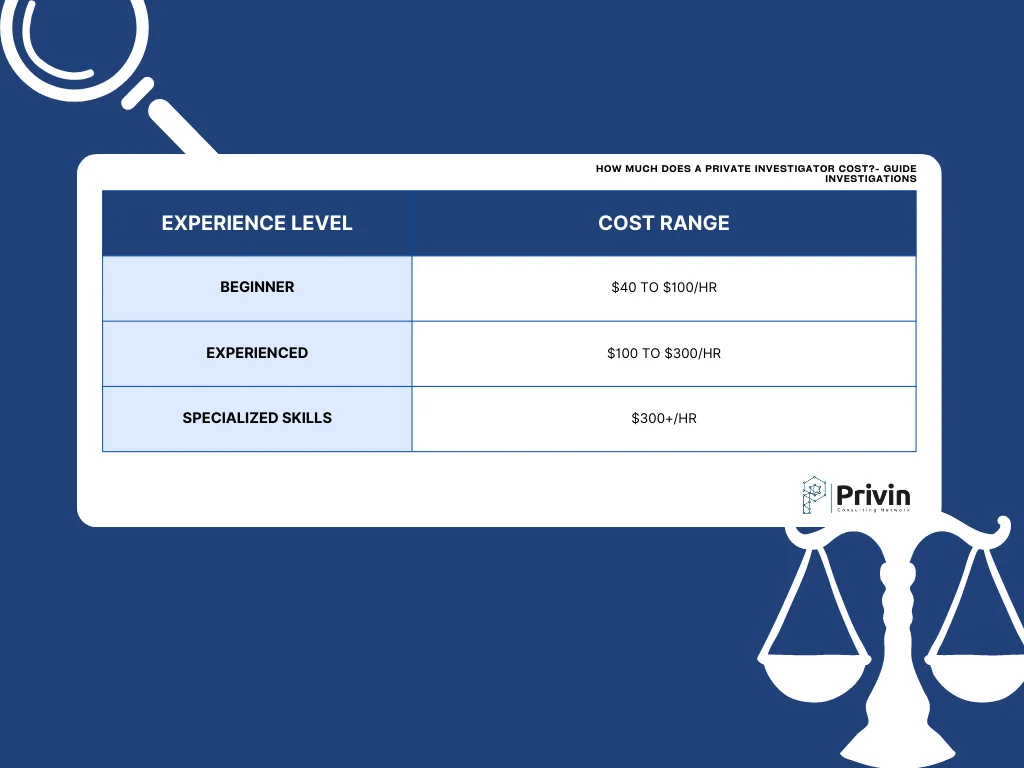
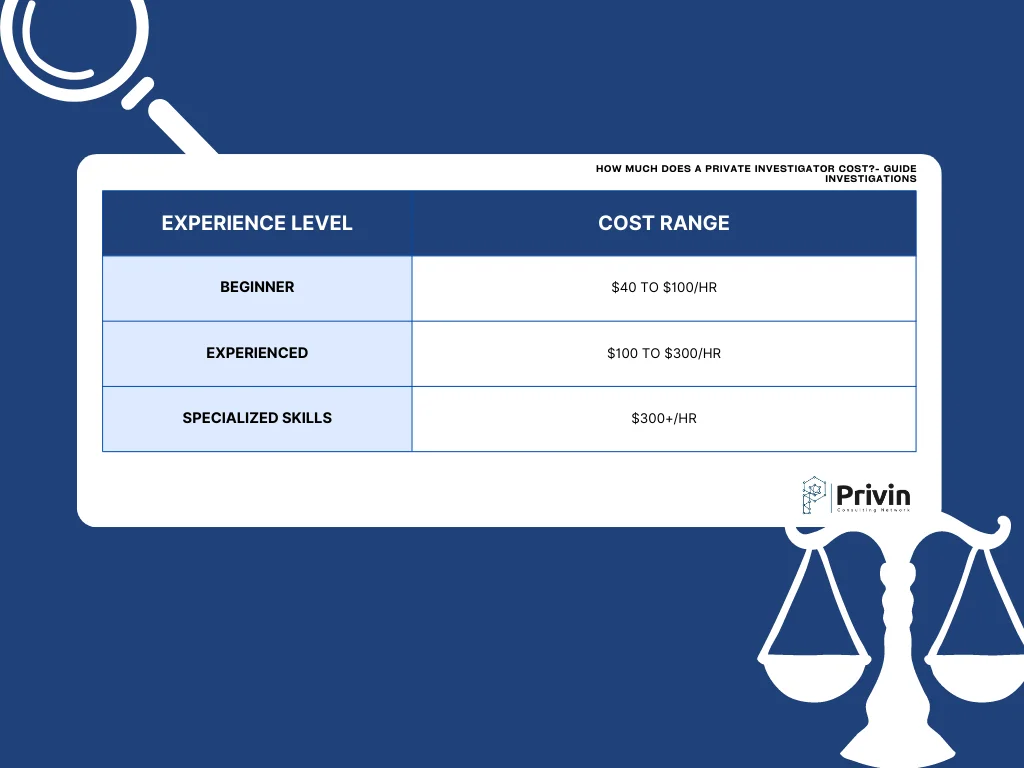
Geographic Location
The location of the investigation is another factor that can greatly influence the cost. In major cities, where the cost of living is high, expect to pay a premium for investigative services.
Urban and rural areas may also be a deciding factor on how much a private investigator may charge. For urban areas, some investigators may charge $100+ per hour. In rural areas, you may find investigators charging anywhere as low as $60 per hour.
Investigators in urban areas often have access to more advanced technology and resources, which is reflected in their higher rates. Conversely, in rural areas or smaller towns, the costs may be considerably lower.
Additional Costs
Beyond the hourly rate, there may be additional expenses you should account for. These could include mileage fees, costs for special equipment, and report generation.
Mileage
Some investigators will charge for the distance they have to travel during the investigation. This is especially relevant in cases involving extensive surveillance.
Equipment
If the case requires specialized equipment like high-quality cameras, GPS trackers, or other surveillance gear, there may be additional charges.
Reports and Documentation
At the conclusion of the investigation, you may request a detailed report outlining the investigator’s findings. Some investigators include this in their hourly rate, but others may charge extra.
Amount of Resources Required
The complexity of your case and the resources required can significantly impact the cost. Investigations that necessitate extensive human surveillance, specialized equipment, or additional personnel will increase expenses. For example, cases involving financial fraud, tax evasion, or high-profile individuals may require more time and resources, thus raising costs.
Key Questions to Ask Yourself Before Hiring an Investigator
Before you hire a private investigator, there are several crucial questions you should consider. These questions not only help you understand the total cost but also ensure that you hire the right professional for your specific needs.
What Is My Budget?
Determining your budget upfront is essential. How much are you willing to spend on the investigation? Setting a clear budget will guide your choice of investigator and allow them to tailor their services to fit within your financial constraints.
Is There a Retainer?
Many investigators require a retainer fee to begin the investigation. Retainers are usually a lump-sum payment that covers a set number of hours of work. They can range from as low as $500 for simpler cases to as high as $10,000 for complex or long-term investigations.
Are There Packages or Flat-Rate Options?
Inquire whether the investigator offers flat rates or packages for specific types of investigations, such as background checks or asset searches. These options can sometimes provide cost savings over hourly rates, especially for straightforward cases.

What Does the Hourly Rate Include?
It’s important to understand what is covered in the hourly rate. Does it include preparation and planning time? What about the time spent writing reports or analyzing findings? Clarifying these points upfront can save misunderstandings later on.
Will There Be Additional Expenses?
Always inquire about the possibility of extra charges. These could be for travel expenses, court appearances, or specialized equipment. Forewarned is forearmed.
Are There Any Discounts?
Though not common, some investigators offer discounts for long-term contracts or for certain types of clients, such as law firms or corporate entities that are likely to provide repeat business.
By carefully considering these questions, you’ll be better prepared to make an informed decision when hiring a private investigator. Open communication about costs and expectations will help ensure a smoother process and a more successful outcome.
Pros and Cons of Various Billing Models
Understanding the billing models that private investigators employ can help you make a more informed decision. Each model has its own set of advantages and disadvantages, and the right one for you will depend on your specific needs and circumstances.
Hourly Rates
This is the most common billing model in the private investigation industry. It is often the most straightforward, but it also leaves room for cost overruns if the investigation becomes more complicated than initially expected. Hourly rates vary based on the factors discussed in the first section, such as the investigator’s expertise, the type of investigation, and the geographic location.
Advantages:
- Flexibility in scope and duration of the investigation.
- Easier to start or stop the investigation as required.
Disadvantages:
- Uncertainty about the total cost, especially for prolonged or complex investigations.
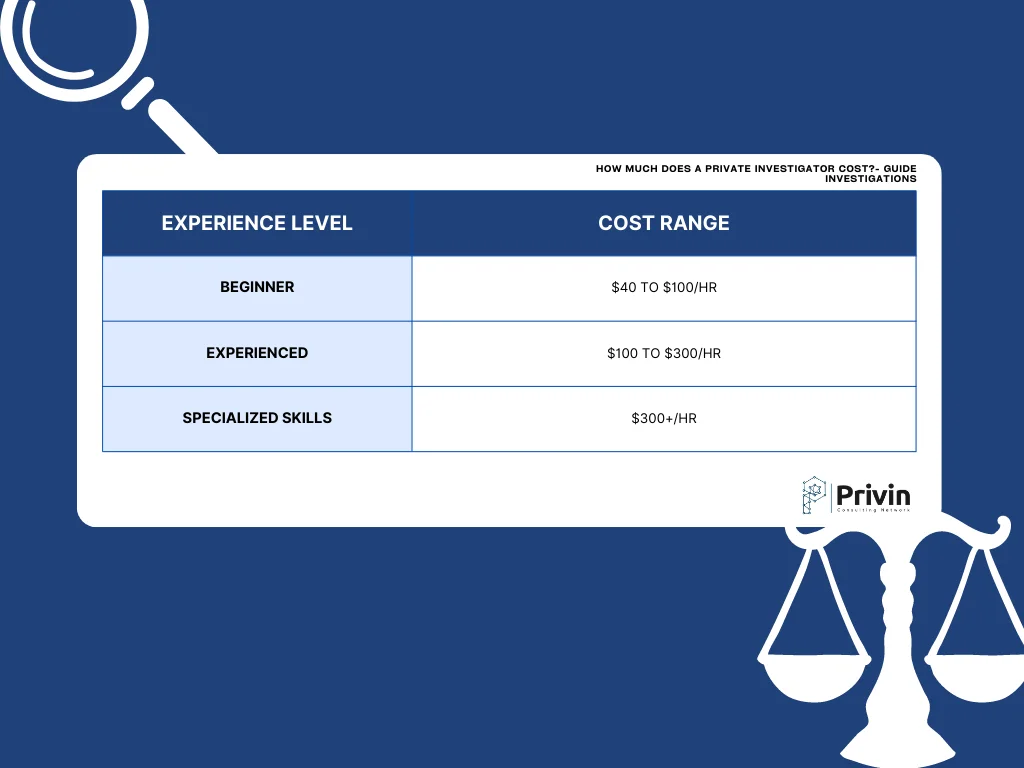
Flat Rates
For certain types of investigations that have a clearly defined scope and expected duration—such as background checks, asset searches, or locating a missing person—a flat rate may be more appropriate. Flat rates offer the advantage of cost certainty, but they can be more expensive if the investigator overestimates the time required.
Advantages:
- Cost certainty and easier budget planning.
- No surprises when the final bill arrives.
Disadvantages:
- May end up paying for services you don’t need if the package includes them.
- If the investigation requires additional work beyond the flat rate, costs could escalate quickly.
Retainer Model
Some investigators require a retainer upfront, especially for more complex or long-term cases. This is a pre-paid amount that the investigator draws from as they work on your case. Once the retainer is used up, additional costs will either require a new retainer or will be billed separately.
Advantages:
- Ensures the investigator’s commitment and availability for your case.
- Easier to manage costs by paying in increments.
Disadvantages:
- Larger upfront financial commitment.
- Possibility of unused hours if the investigation concludes early.
Results-Based Model
This is a less common model where the investigator’s fee is contingent on achieving certain predefined outcomes. While this might seem attractive, it’s worth noting that this model can raise ethical concerns and may even be illegal in some jurisdictions.
Advantages:
- Pay only if the investigation is successful.
Disadvantages:
- Can be more expensive as the investigator takes on more risk.
- Ethical and legal concerns could arise.
Selecting the right billing model depends on various factors like the nature of the case, your budget, and how you prefer to manage finances. Always discuss billing options upfront with any prospective investigator and make sure all financial terms are clearly laid out in your contract.
High-Cost Cases Private Investigators Handle
Certain investigations have variables that can significantly increase the overall cost. These special cases often require advanced skill sets, specialized equipment, or extensive fieldwork.
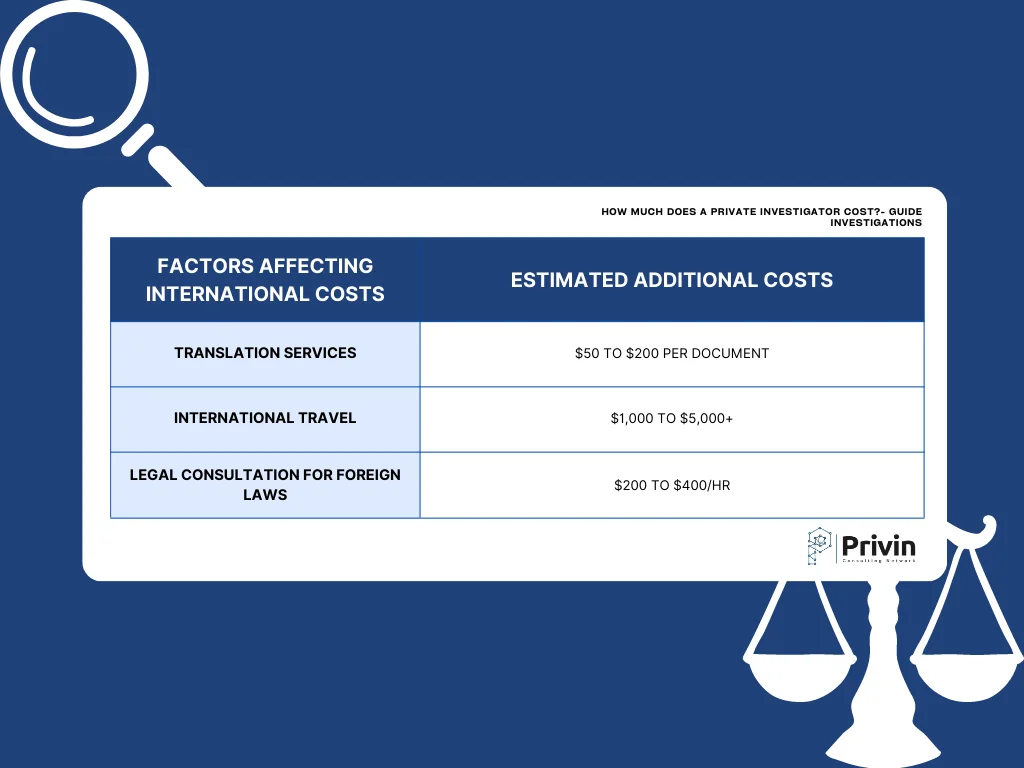
International Cases
Investigations that extend beyond national borders often come with an array of challenges, including language barriers, legal complications, and increased travel expenses.
Technologically Intensive Investigations
Cyber investigations, data retrieval from complex systems, or advanced forensic work are not only time-consuming but require highly specialized skills.

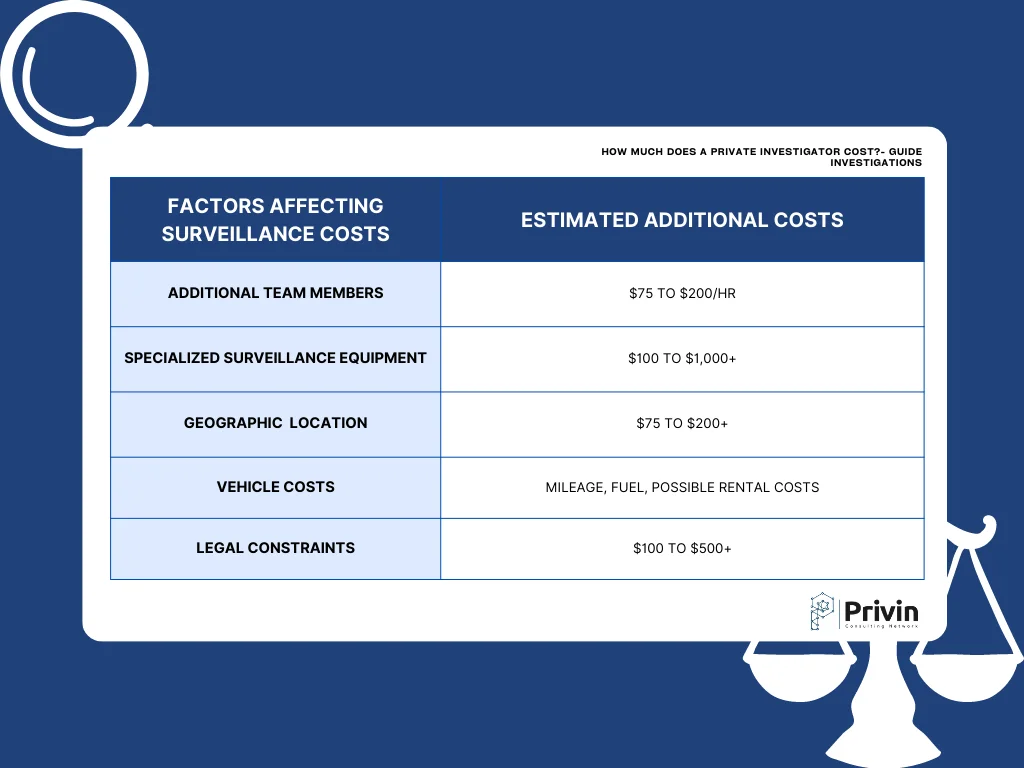
Stakeouts and Long-Term Surveillance
24/7 surveillance or stakeouts for an extended period can incur costs not just for the investigator’s time but also for any additional team members needed, equipment, and travel expenses.
Court Appearances
If an investigator needs to appear in court to present findings, this typically comes at a higher rate due to the preparation required.
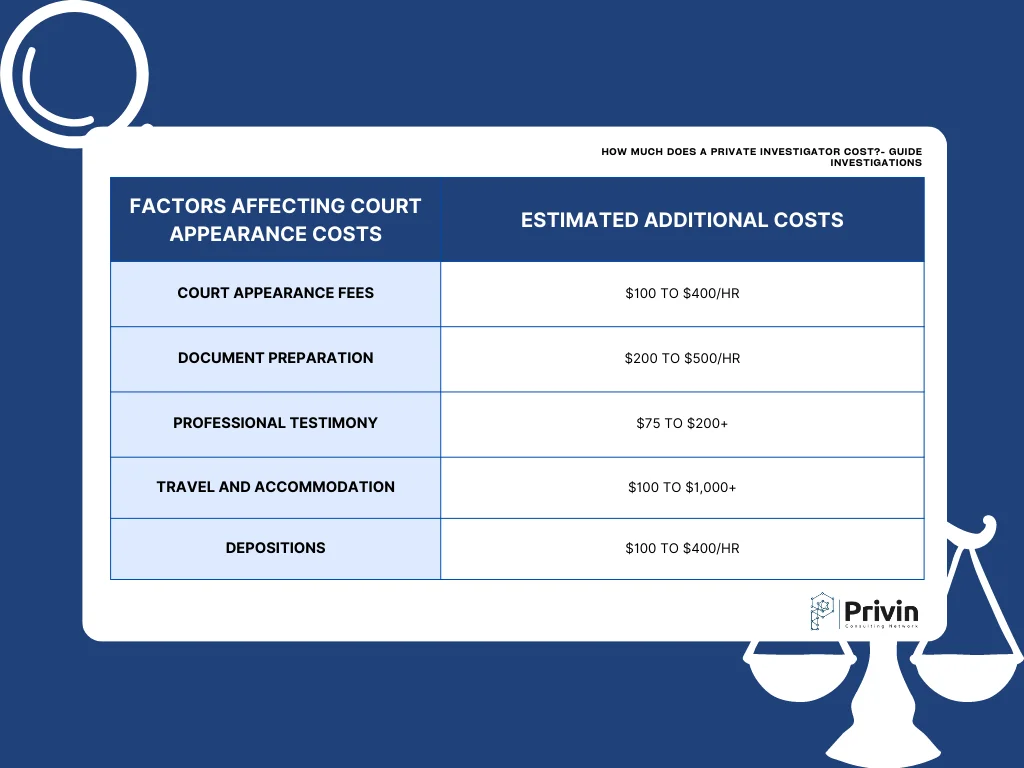
When dealing with special cases, always establish a comprehensive understanding of the cost structure. These types of investigations can quickly become expensive, so clear communication and a well-defined contract are essential.
How to Save Money When Hiring a Private Investigator
While hiring a private investigator is often a necessary expense, there are ways to manage costs effectively:
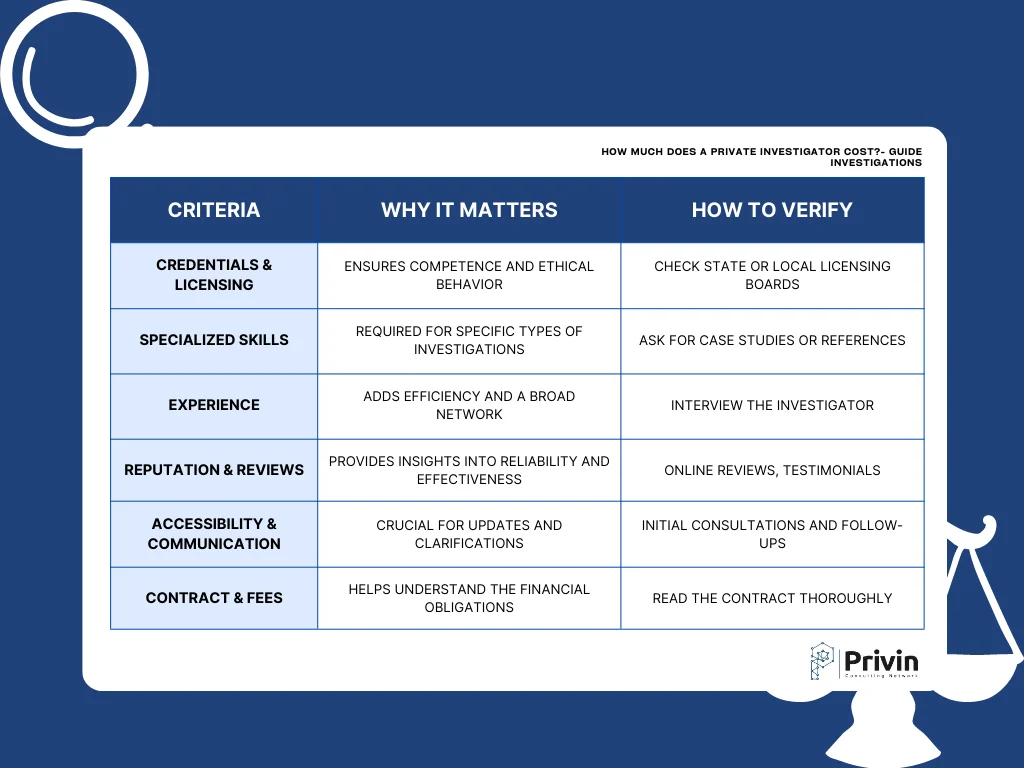
- Set Clear Objectives: Knowing what you want to achieve can help streamline the investigation.
- Review the Contract: Make sure you understand all charges and ask for clarification where needed.
- Ask for Itemized Billing: This allows you to see where your money is going and helps you dispute any charges, if necessary.
- Negotiate: While not all costs are negotiable, some might be, especially for longer-term contracts.
- Do Some Legwork Yourself: Certain elements of the investigation, like gathering initial documentation, can be done by you to save time and money.
By being proactive and involved, you can exert some control over the investigation’s overall cost. Remember, cheaper is not always better; the investigator’s competence should be your primary concern, with cost as a secondary consideration. Learn more in our article on Mistakes to Avoid When Hiring a Private Investigator. Additionally, for a comprehensive guide on selecting the right private investigator, read our article on How to Hire the Right Private Investigator for Your Needs.
Legal Considerations
It’s crucial to remember that while private investigators can provide a wealth of information and insights, they must operate within the law. Illegal activities like trespassing, hacking, and wiretapping can not only jeopardize your case but could also result in legal penalties for both you and the investigator. Always ensure that the investigator you choose is committed to operating within the legal frameworks of your jurisdiction.
It’s also essential to understand the legal boundaries within which private investigators operate. Knowing the difference between a private investigator and a law enforcement detective can clarify expectations. For more insights, see our article Do Private Investigators Have Badges? Private Investigator vs Detective.
Faqs Related to Hiring a Private investigator
1. How much does a private investigator cost?
Private investigator costs range from $50 to $500 per hour, depending on the type of investigation, experience level, and location. Flat fees for services like background checks may cost a few hundred to several thousand dollars. Complex cases often require a retainer.
2. How much do private investigators charge per hour?
Hourly rates typically range from $50 to $500, with the average being $105. Rates vary based on the investigator’s experience, case complexity, and location.
3. How much does a background check cost with a private investigator?
Background checks usually cost between $50 and $500, depending on the depth of the information needed. Simple checks are cheaper, while comprehensive reports cost more.
4. What is the average cost of surveillance by a private investigator?
Surveillance costs range from $90 to $200 per hour, influenced by duration, equipment, and case complexity. Additional expenses may apply for multi-location or extended surveillance.
5. Do private investigators require a retainer, and how much is it?
Many investigators require a retainer, typically from $500 for simple cases to $5,000+ for complex ones. This upfront fee covers initial work and expenses.
Final Thoughts
Hiring a private investigator is a decision that can carry significant financial and personal implications. Understanding the costs involved can help you make an informed choice that balances both your budget and your needs. The right investigator can provide you with valuable services that are worth the investment. But the wrong choice could cost you money, time, and even legal trouble. Being informed is the first step in making the right decision.
We hope this comprehensive guide has provided you with the in-depth information you need to understand the costs involved in hiring a private investigator and how to make the best choice for your unique situation. Contact Privin for a free consultation, and let our expert private investigators provide you with the professional assistance you need. Whether it’s personal matters or business concerns, we’re here to help you uncover the truth efficiently and confidentially.






